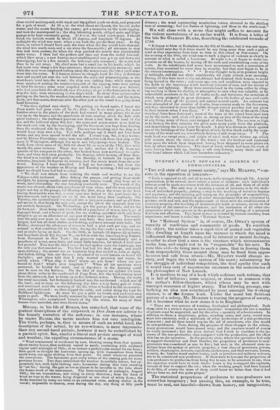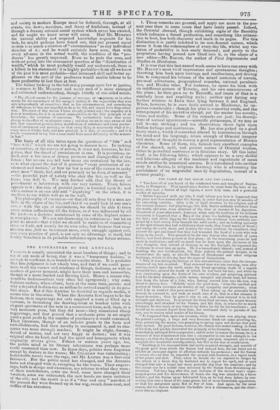tion the own now were in was udeed very bad
; they were worn down with The " Rational System " is, of course, Mr. OWEN'S system of fatigue, had lost all their clothes and bethliug, and were covered with boils. On Friday, shortened the allowance of water to half a pint each per day, and re- equality of conditions and community of goods. To establish mained in that condition till the 30th, during the dabs under a scorching bun, his object, the author takes a rapid view of animal and vegetable and at night laying on (leek. On the 30th, in latitude 32 degrees :25 minutes, life ; dwelling at length upon the manner in which the mind is and longitude about 7ei degrees 'W., we fell in with the American brig Rupert, influenced through the senses, and by internal or mental feelings, from 'laminar to New York : the generous captain immediately rent a
in order to show that a man is the creature which circumstances
tel grateful. This was the third veesel we haul spoken since the hurricane, but make him, and ought not to be " responsible " for his acts. To the only one that assisted us. The first bad had his deck swept, and could cure this evil—to bring men to such a pass, that in freeing them spare nothing ; the second WA. an American brig that we fell in with at night, from responsibility those around them may be freed from appre- and bailed, telling him our distress: he asked if we could remain on board till hension and safe from attack—Mr. MURPHY would change so- daylight ; and when told that I only wanted provision and water, he ciety, and begin the whole system of life anew; substituting for surlily asked, What ship is that? where are you from? where are you bound to then ? what's your longitude ? ' When all his questions were the struggle of individual competition, the dead apathy (for such answered, he hauled his wind, and at day-dawn in the morning cuuld it would turn out) of monotonous existence in the monasteries of just be seen on the horizon. On the 31st of August we sighted the land, the philosopher of New Lanark. about thilty 'Mien to the southward of Cape Fear, but the wind coming more It is needless to say of a book which enforces such notions, that from the eastward, had to bring up in five fathoms water. During the night it is full of fallacies ; some original, or shared in common with the wind increased, but fortunately backed into the northward t which was Off the land), and at noon on the following day blew a very heavy gale of wind, the author's fellow-thinkers, whilst others may be met with and continued until the morning of the 24, when it backed to the west-north- amongst reasoners of higher stamp. The following passage, em- west, and moderated : we then slipped the cable, and sailed along the land for bodying an idea now entertained by many amongst the working Baldhead lighthouse. At noon we got a pilot on board, and anchored once classes, is of Ilbe former kind. Under the usual but fictitious more in port. We were kindly received by the good people at Smitliville and picture of a colony, Mr. MURPHY is tracing the progress of society, Wiltniugtou, who complained bitterly of the late storm, for many of their till it becomes what he new states it is in England.
" There are two systems of training, theological and philosophical. Both MOORE, in his life of BYRON, has remarked, that some of the these exist to a certain degree in most countries : to maintain the one a number poetical descriptions of the shipwreck in Don Juan are inferior to of priests must be supported, and for the other a quantity of schoolmasters. In the homely narrative of the sutihrers ; in one instance, where addition to these, a magistracy, police, standing army, and navy, would soon he copies BLIGH, the metre renders him not very intelligible. start into existence, with a multitude of other professions of a non-productive character ; and all these would require the aid of attendants, who also would The truth, perhaps, is, that in scenes of such an awful kind, the be non-producers. Now, during the progress of these changes in the colony, description of the actual, by an eye-witness, is more impressive many generations would have passed away, and the numbers would of course than any second-hand picture, however it may be embellished by be vastly increased ; but the main feature that I wish to elucidate is the in- a poetical spirit. See, amidst a literal and prosaic accotInt of wind crease of the non-productive class compared with the productive, and the effect and weather, the appalling circumstances of a storm, this has on the operative. In the primary state, where the operatives had only 1. Wind commenced at north-east by east, blowing strong from that quarter to support themselves and their familiee, the proportion of producers to non- about twelve hours, then suddenly veered to north, continuing with unabated producers was considered as one to five ; but now, in the advanced state re. midnight of 18th ; in an instant a perfect calm ensued for one hour; sultant from the system of private property, a vast class of governors, priests, vigour until then quick as thought the hurricane sprung up, with tremendous force from soldiers, shopkeepers, lawyers, capitalists, landowners, and their servants, horses, hounds, &c. besides many useless trades, such as jewellers and military artisans, south.west, nut again shifting from that point. No swell whatever preceded many are to be considered non-producers. If these were to increase the proportion of the convulsion. The barometer gave every notice of the coming gale for non-producers to producers, from being five to one, to be seventeen to one, then previous bouts. Two days antecedent the weather beautifully serene, but op- ressieely hot, with light shifting airs; barometer during that time standing the operative would have to work twelve bouts a day to support the eighteen, most to be invisible in the tube above instead of four to support the six ; when the working people had been trained at 'set fair,' during the gale as low as al
time frame-work of the inetrumeut. The force subsided at midnight, August to do this, of course the mass of them d could know no better than that it ha always been so, and was quite proper."
wind no tops to the waves, being dispersed in one sheet of white foam ; the The statistical proportions of producers to non-producers are decks tenanted by many sea birds in an exhausted state, seeking shelter in the somewhat imaginary ; but passing this, an example, to be true, vessel; impossible to discern, even during the day, any thing at fifty yards must be real, not fanciful—drawn from history, not imagination; and society in modern Europe must be deduced, through, at all events, the dawn, meridian, and decay of feudalism, instead of through a dreamy colonial social system which never has existed, and for aught we know never will exist. Had Mr. MURPHY the natural ability and acquired knowledge requisite for his task, he might perhaps have found out, that our present social system is as much a creation of "circumstances" as any individual member of it ; and he would certainly have seen, that with every advance in the actual world, the condition of the "pro- ducers" has greatly improved. Even as he puts the case, and without going into the economical question of the "distribution of wealth," which he most probably would not understand, there is a fallacy in his statement: it is highly probable—from all we know of the past it is most probable—that increased skill and better ap- pliances on the part of the producers would enable labour to be more productive at last than at first. The fallacy lurking in the following passage upon law or justice. is common to Mr. MURPHY and many men of a more enlarged aad cultivated understanding, though chiefly of one-sided minds.
"The alleged reason for the justness of revenge, or vengeance, or in other words, for the conectness of the savage's justice, is the supposition that man acts independently of causation ; that in the circumstances, and considering all influences, he was not impelled to du as he did, and might have done other- wise. The error of this notion I have already pointed out ; the stupidity of it is most wondrous, for it is an actual contradictiun to the first principle of all knowledge, the intuition of causation. We instinctively know that every change is the effect of an adequate cause ; and thus we are at once aware of the fact, that causation governs every modification of substance and every produc- tion of excitement and motion ; SO that every thing is necessarily what it is ; every animal thinks, feels, and acts precisely as it does of necessity ; and it is totally nonsensical to say that a man could have acted diff:rently to the manner he has."
The basis of all this turns upon the questions of " fate" aid
" ;" which we are not going to discuss here. In looking at causation, or the causes of action, it must not, however, be for- paten, that the dread of punishment is one. It is powerless, in- deed, over a few uten of strong passions and disregardful of the future ; but no one can tell how many are restrained by the law, or to what extent the fear of it governs "every production of ex- citement and motion," or how for law is one of the causes to make every man " think, feel, and act precisely as he does, of necessity " —the peaceful part of society who obey the law, as well as the felons u ho defy it. We may further add, that the theory of punishment is interwoven with our very nature. Every fiction appeals to it : the rule of poetical justic-5 is founded upon it; and when nature is on one side and " argulying " on the other, it is net (Hess to say which will go to the wall. The philosophy of causation—or that all acts done by a man are links in the chain of his life, and that if we could look at any one's urea with the eye of omniscience, we should be able ta trace every action influencing all the future, as it was influenced by all the vast—is a doctrine maintained by some of the highest names in metaphysics. We ale not discussing its correctness ; but let us point its moral—that whilst we should be cautious of committing error or fault, not merely for its own sake, but because that com- mission may fete us to commit more, every struggle against evil, and every practice of' good, is not only an advantage in itself, but doubly beneficial in its probable influence upon our future actions.



























 Previous page
Previous page